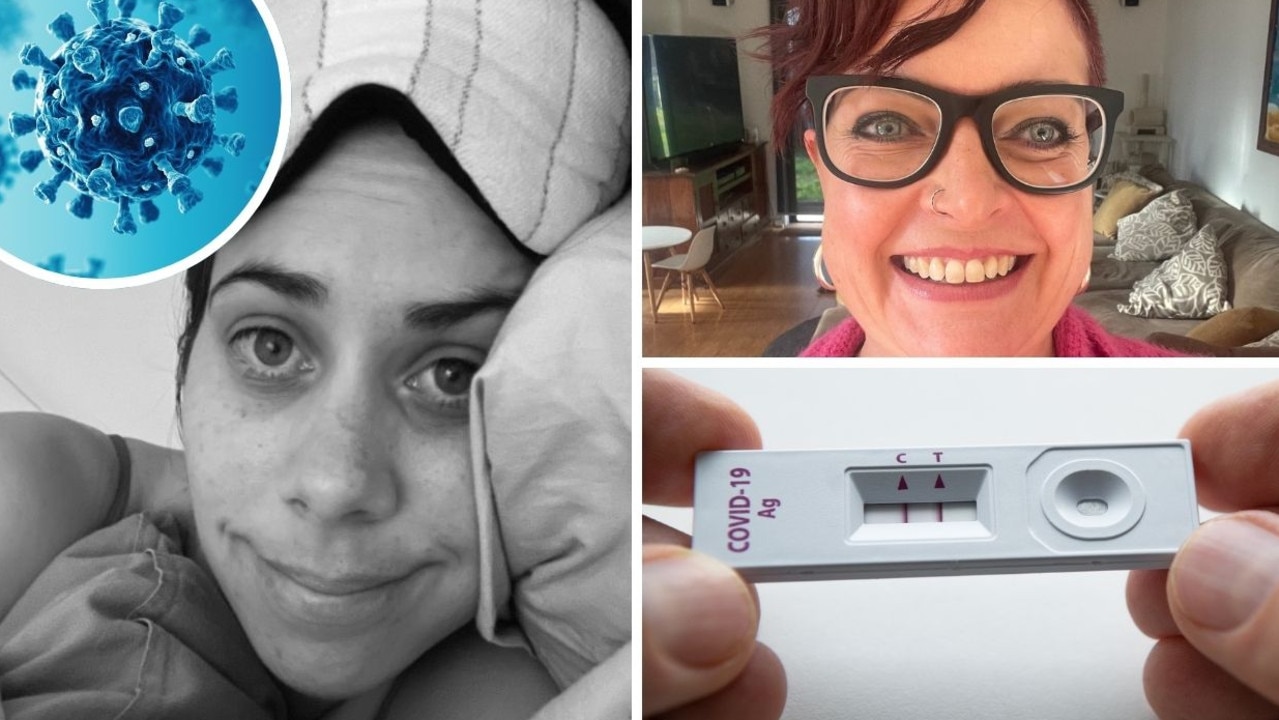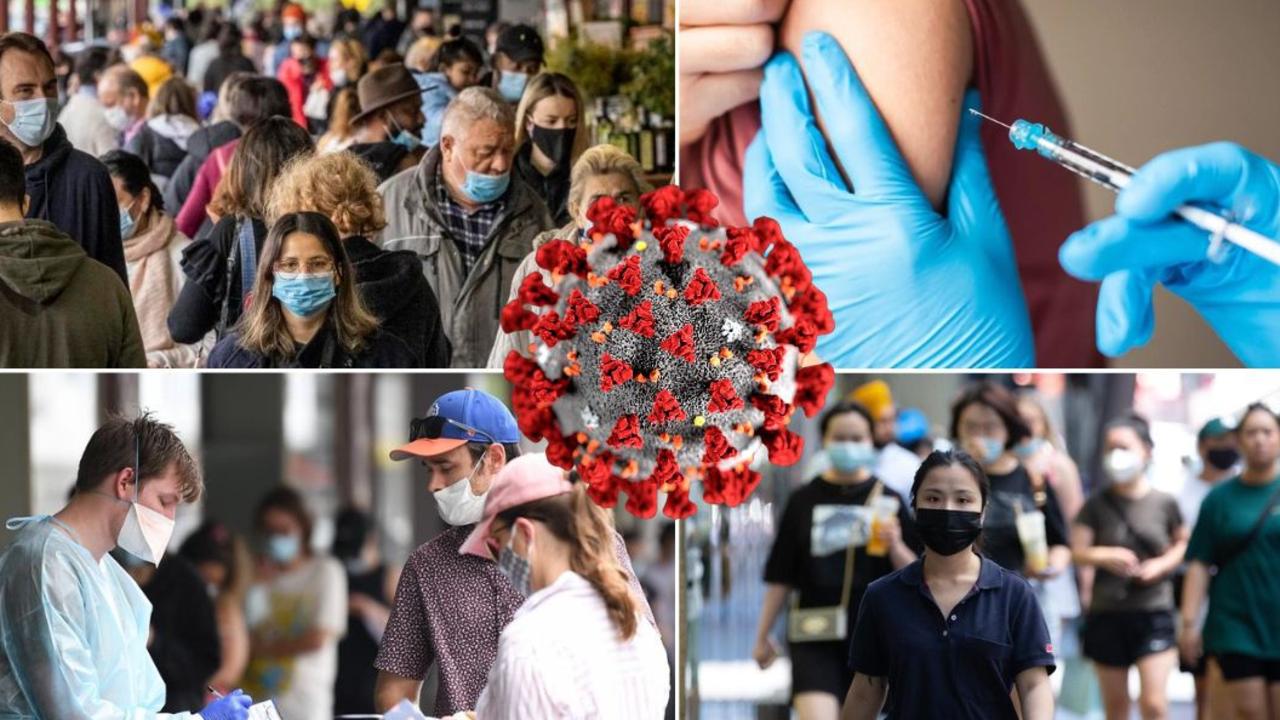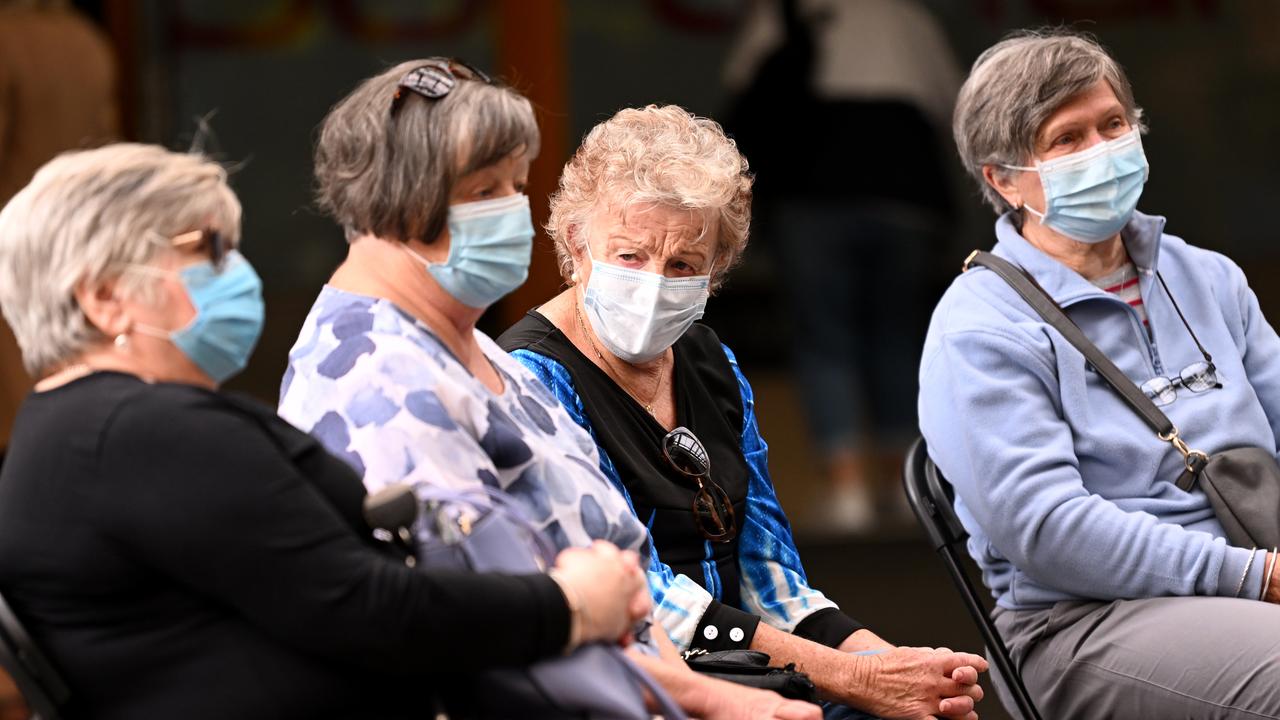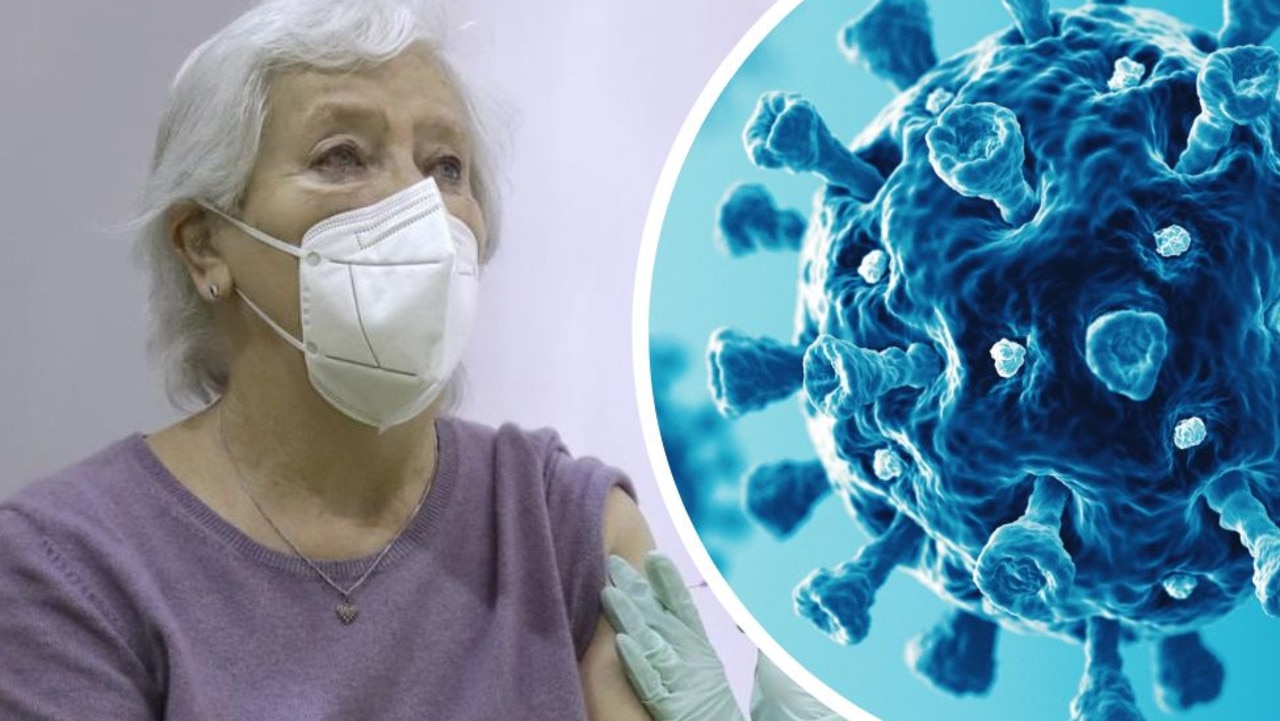Coronavirus latest: Victoria records 1488 new Covid-19 cases, two deaths, Scott Morrison reopens travel for November
Victoria has recorded 1488 new Covid cases, while NSW suffers 10 deaths as a vital milestone nears and Scott Morrison ends Australia’s travel ban.
Coronavirus
Don't miss out on the headlines from Coronavirus. Followed categories will be added to My News.
Victoria has recorded 1488 new Coronavirus cases on Saturday and two deaths as the state’s regions are hit with more lockdowns and Scott Morrison ends Australia’s travel ban.
Residents in Moorabool shire and Shepparton have again been plunged into lockdown.
In NSW, the state announced 813 new locally acquired cases and 10 deaths on Saturday morning.
The new Victorian cases were detected from 71,224 test results, bringing the state’s total number of active cases to 11,591.
It comes after Victoria recorded 1143 new cases of Covid-19 on Friday and recorded an almost 50 per cent jump in infections Thursday with 1438 new cases.
Both Moorabool Shire, west of Melbourne, and Shepparton have now entered into a snap week long lockdown following a rise of cases in the local government area.
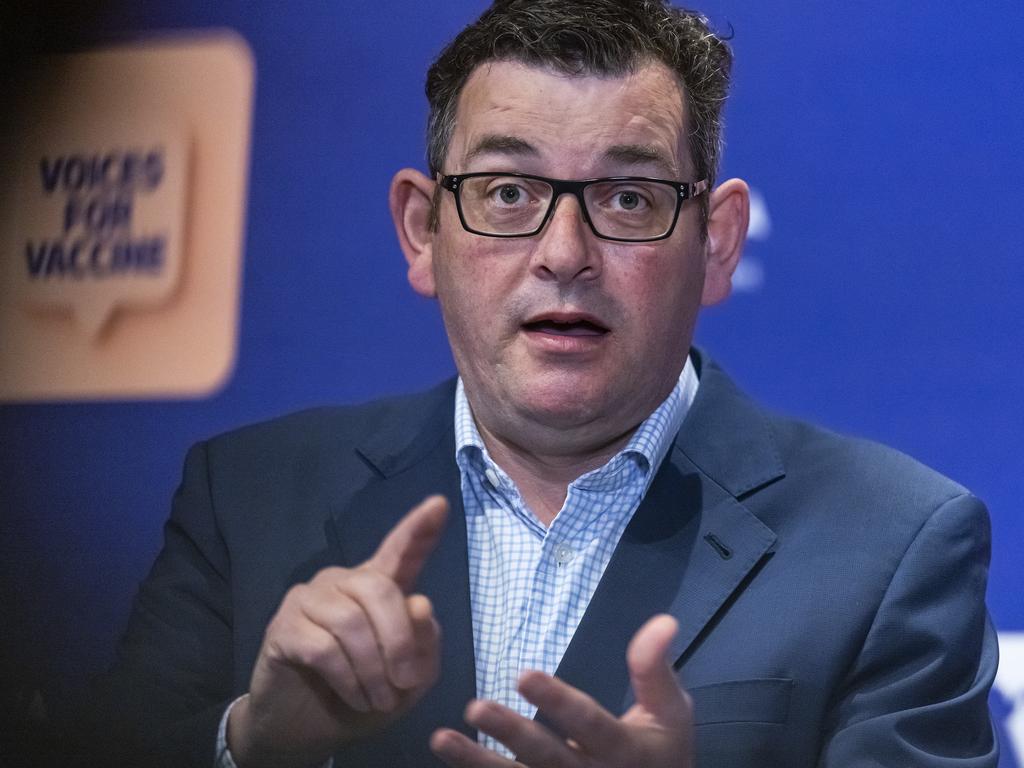
Queensland recorded two new local cases on Saturday, to lift the number of active cases in the state to 25.
The new local cases were children of a Gold Coast case and linked to the aviation instructor announced earlier in the week, with health authorities checking that the children were not out in the community.
Another two cases were recorded in hotel quarantine overnight.
The news will be welcomed by the NRL, with Brisbane to host the Rugby League Grand Final on Sunday, but the crowd capacity at Suncorp Stadium has been reduced to 75 per cent.
According to the NSW Health, as of Saturday morning, 87.7 per cent of NSW residents aged older than 16 had received their first dose, and 65.2 per cent were fully vaccinated.
It is projected 70 per cent of eligible residents in the state will have had both of their coronavirus shots by October 6, as Sydney and NSW ready to open up again.
Meanwhile, the ACT on Saturday recorded 52 new cases of Covid-19 for the second day in row and no deaths. Chief Minister Andrew Barr said while case numbers increased, there was no change to the plan to ease restrictions at this point.
“We will have an ongoing review of case numbers and other mitigating factors that counterbalance the increase in case numbers, the vaccination rate being the principle mitigating factor,” he told reporters.
QANTAS RESTARTS INTERNATIONAL FLIGHTS, PM OPENS TRAVEL
Prime Minister Scott Morrison has confirmed Australia’s international border ban will end in November as states move into the 80 per cent vaccination rate.
He said to reopen safely and to stay safely open under a national plan, Australia needs to see its home quarantine pilots in New South Wales and South Australia also be successful so they can be rolled out at scale.
Mr Morrison said current overseas travel restrictions related to Covid-19 will be removed and Australians in those states with 80 per cent vaccination targets met will be able to travel.
“It’s time to give Australians their lives back. We’ve saved lives. We’ve saved livelihoods but we must work together to ensure that Australians can reclaim the lives that they once had in this country. And we must work together to achieve that goal,” he said.
He said Australian citizens and permanent residents fully vaccinated will have to undertake a seven day home quarantine.
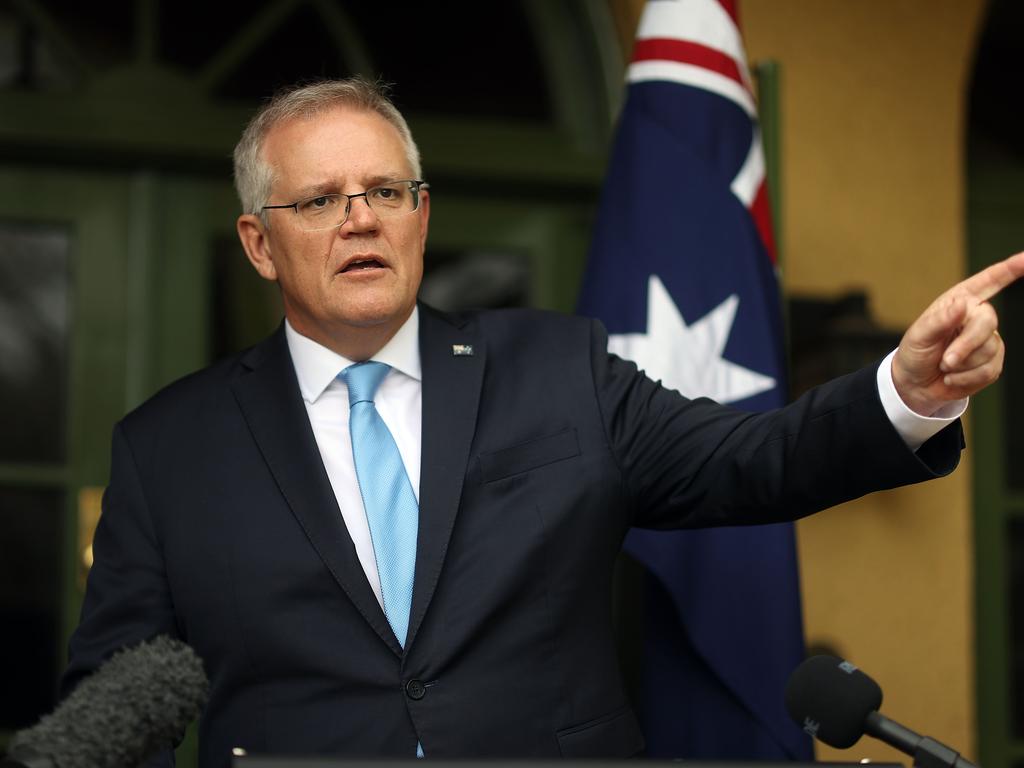
Unvaccinated Australians will need to go into a 14-day managed quarantine as we move to a phase where caps will be lifted if you’re vaccinated.
“Caps will remain for non-vaccinated and there will be the managed quarantine process for the 14 days,” he said.
“We’re also offering facilitated commercial flights for Australians overseas into states and territories that agree to commence the home quarantine trials.”
He said they will be working towards complete quarantine-free travel for certain countries such as New Zealand when it is safe to do so.
“Australians who want to travel overseas once restrictions are removed will be able to access an internationally recognised proof of vaccination document,” he said.
“That will be in the coming weeks, to prove their vaccination status abroad. And that proof of vaccination for international travel will include a QR code that is readable globally.
“It works in with the system that is are used all around the world.”
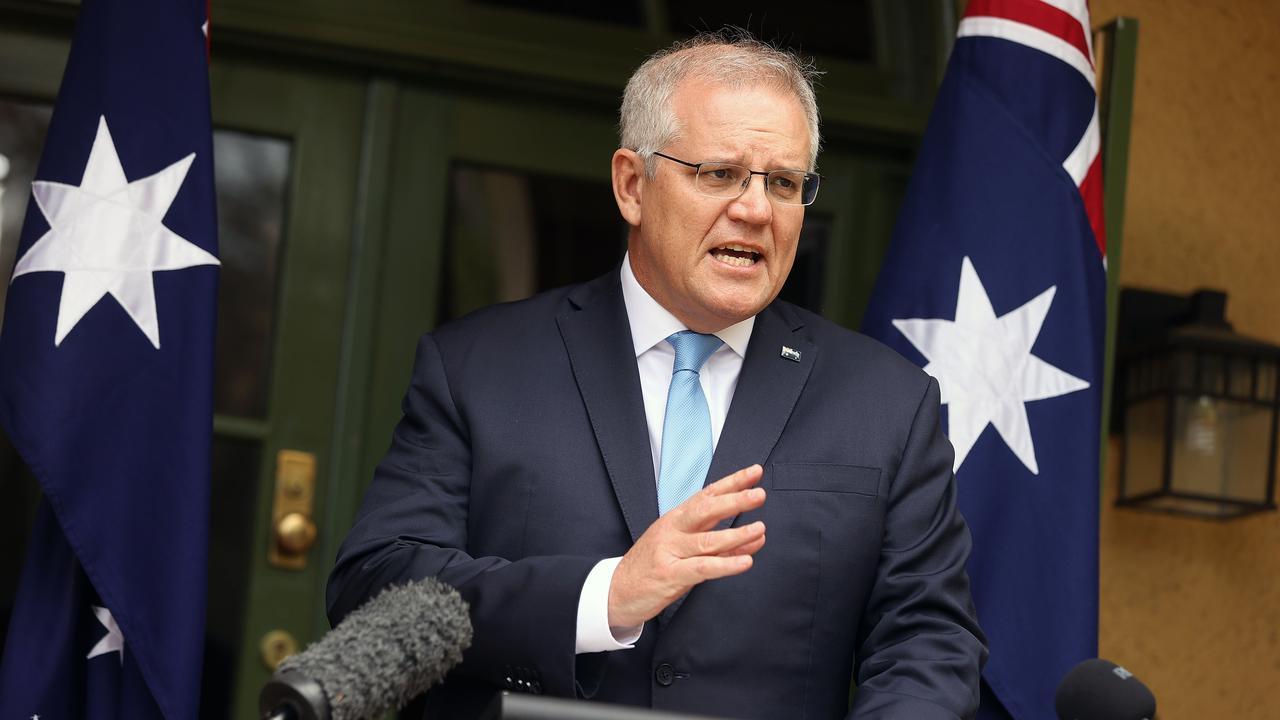
The decision to lift the travel ban has seen Qantas bring forward the restart of its international flights to November 14.
Qantas Group CEO Alan Joyce said: “The early reopening of Australia’s international borders will mean so much to so many people and it’s made possible by the amazing ramp up of the vaccine rollout.
“We know Australians can’t wait to travel overseas and be reunited with their loved ones, and literally thousands are waiting to come back home, so this faster restart is fantastic news. It also means we can get more of our people back to work, sooner.”
The national carrier will operate three weekly return flights between Sydney and London and three weekly return flights between Sydney and Los Angeles with its Boeing 787-9 Dreamliners.
Fares are now on sale for Australian citizens, permanent residents and their immediate families and some visa holders.
Fares start from $1662 return for Sydney-Los Angeles and $1869 return for Sydney-London.
All flights on both routes for the first week will be ‘Points Planes’, meaning frequent flyers can access uncapped Classic Flight Reward seats across all cabins.
Seats on these flights will also be available as regular flight bookings.
Once the Federal Government announces the exact date that Australia’s international borders will reopen in November, the commencement dates for these two routes may need to be updated.
Flights will be brought forward if its earlier than November 14 or moved.
Customers booked on these flights will have the flexibility to make ‘fee free’ date changes for travel until December 31 2022 (a fare difference may apply).
If flights are cancelled customers may also be eligible for a refund or credit voucher.
Passengers on Qantas’ international flights will be required to be fully vaccinated with a TGA-approved or recognised vaccine (there will be some exemptions for medical reasons and children). They will also be required to return a negative PCR test 72 hours prior to departure.
At this stage, all other international routes that were scheduled to resume from December 18 will continue as planned.
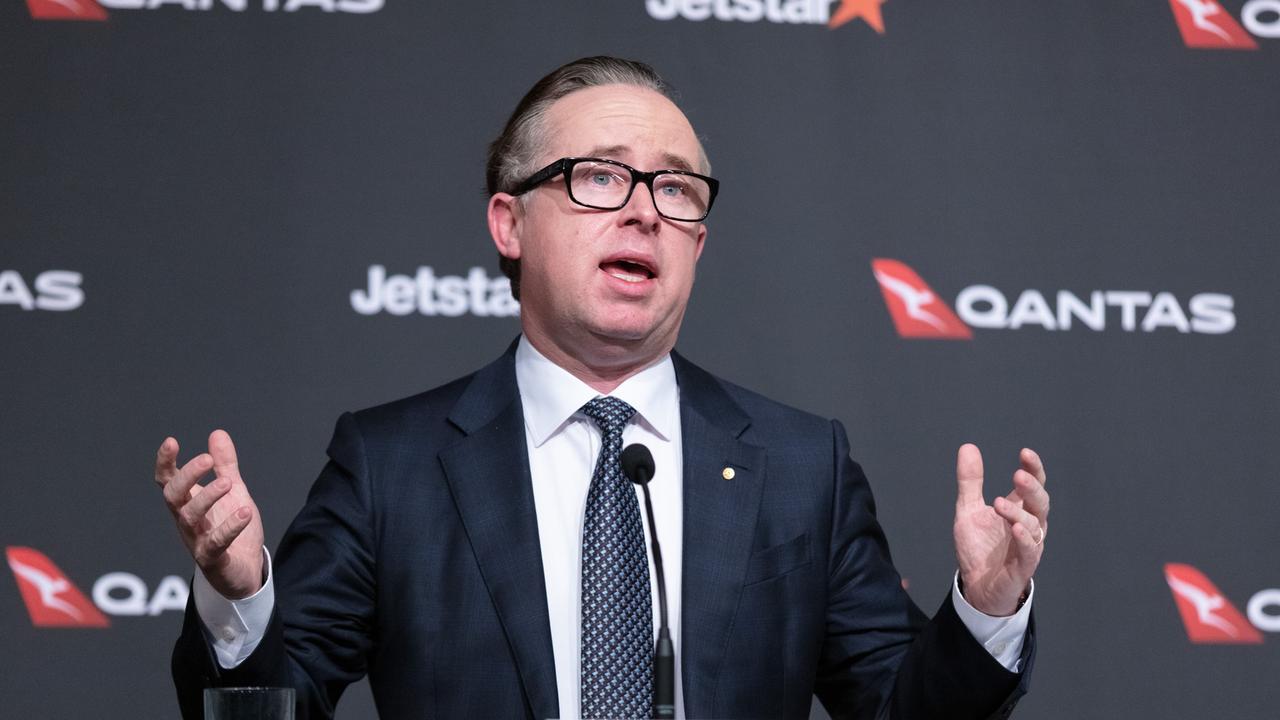
The move to lift the international flight ban has travel and tourism groups buzzing, with Melbourne Airport CEO Lyell Strambi said he’s ready to reopen international travel as soon as it’s allowed.
“The framework to reopen international travel will be of great comfort to those that want to reunite with loved ones before Christmas,” he said.
“The past 18 months have been extremely difficult for Australians and people stranded overseas. Lives and livelihoods depend on tourism and travel, it’s time that we reconnect with the rest of the world.”
Expedia Group’s Eacham Curry, Director, Government and Corporate Affairs for ANZ, added: “The announcement today gives renewed trust and faith that international travel for Australia will resume safely in due time. We commend the government for taking this positive step forward, and together, the industry will be prepared to help our travellers navigate through this phase.”
Mr Morrison also said the TGA has also been reviewing other vaccines in widespread use around the world.
“It has advised that these vaccines should be approved. As recognised vaccines for the purpose of determining incoming international travellers,” he said.
“Those vaccines are Sinovac and Covid Shield. They will be particularly important for those coming from countries where those vaccines are being used. India is an obvious one of those, as is China and other countries throughout South-East Asia.”
NSW residents are likely to be the first to be able to head off overseas and will be able to trial a seven-day home quarantine option.
A furious Queensland Premier said she was not told about the proposed early reopening of international borders by Prime Minister Scott Morrison, before news of the plan leaked this morning.
“I look forward to hearing about that plan. It has not been distributed in any papers to national cabinet, prior to national cabinet’s meeting,” Annastacia Palaszczuk said at Friday’s Covid update in Brisbane.
Ms Palaszczuk added she was not going to agree to any easing of restrictions until she saw formal paperwork.
“It would be irresponsible and I think Queenslanders would expect me to see some paperwork to understand the issues before an announcement is made,” Ms Palaszczuk said.
“It’s a bit disappointing that we haven’t been given that due courtesy before national cabinet.”
NSW RECORDS 864 NEW VIRUS CASES
New South Wales has recorded 864 new local coronavirus cases and 15 deaths as an important vaccination milestone draws closer.
It is currently projected 70 per cent of eligible residents in the state will have had both of their coronavirus shots by October 6.
If that’s the case, NSW will be on track to ease restrictions for those people the following Monday.
It will mean the fully vaccinated will be able to go to pubs, gyms and retail stores again, among other new freedoms.
‘NO EXCUSE’: WARNING TO QLD RESIDENTS
Queensland’s top doctor has pleaded with residents to rush out and get vaccinated as health authorities juggle yet another new cluster in the community.
Two new locally acquired Covid-19 cases were reported on Friday, with one linked to the aviation instructor announced earlier in the week while the other was added to the half-a-dozen new cases not connected to an existing outbreak.
Despite the escalating threat, chief health officer Jeannette Young resisted the urge to advise a lockdown but urged Queenslanders to get vaccinated on the weekend.
“Please, we have plenty of vaccines,” the top doctor told reporters on Friday morning.
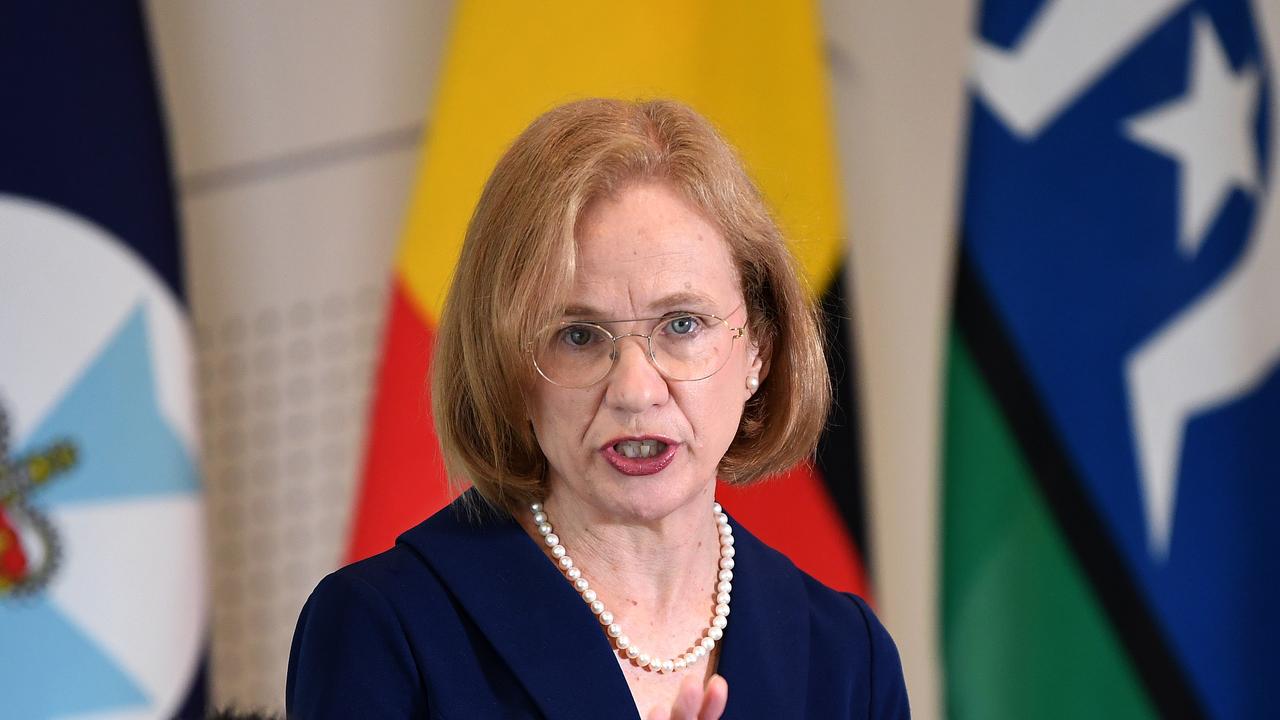
“There is walk-in capacity available, GPs, our pharmacists are doing a fantastic job. Everyone — there is absolutely no excuse.”
The new cluster revealed on Friday emerged in a man who travels between Queensland and NSW to transport animals. He was infectious on the Gold Coast for one day.
“He was on the Gold Coast on the 29 (of September) for a short period,” Dr Young said.
“I don’t think he’s a risk.”
The other new case was linked to the man who works at the aviation training centre but was potentially a greater risk to the community given he was infectious in the community for four days from September 25.
“He went with his family down to the Gold Coast and stayed in Kirra at the iconic Kirra Beach Resort for four day and he was infectious during the four days,” the CHO said.
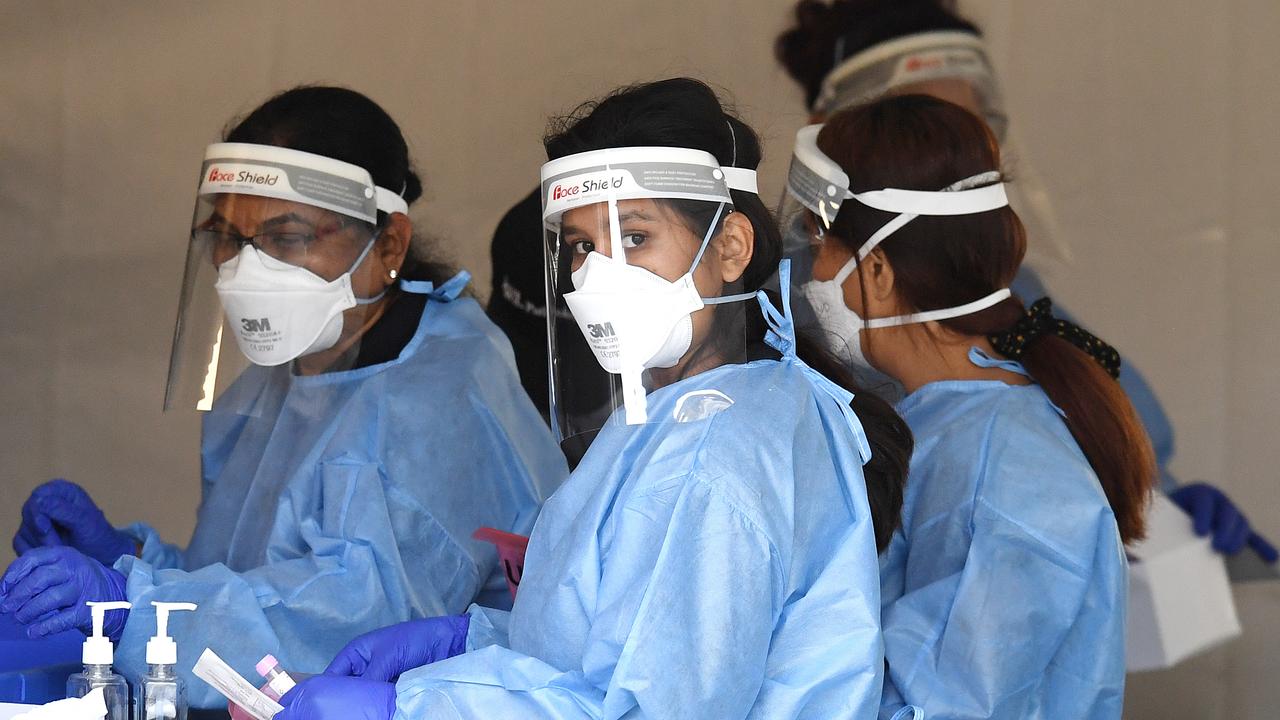
“Anyone who has been to the North Kirra Surf Lifesaving Club, the Kirra surf club, to Timezone and local cafes and Woolworths at The Strand — we’ll put out the specific times — but please, anyone who has been to any of the venues or anywhere in that part of the Gold Coast over the last week, if you’ve got any symptoms at all, now is the time to really please come forward and get tested.”
Premier Annastacia Palaszczuk again resisted the urge to order a lockdown despite the escalating threat, insisting the current Covid management was a day-by-day situation.
“It’s encouraging news today that we do not have any unlinked community transmission when we’ve had a high level of testing,” she said.
“(But) I will have no qualms — people know me, they know Dr Young — we will act swiftly and we will go hard and fast.”
HOSPITALS BUCKLING UNDER Covid
Doctors have warned Covid-19 has overburdened the health system, with patients dying from treatable conditions while others have languished in ambulances and emergency department corridors unable to access a bed.
The alarming findings were put in a discussion paper drawn up by health officials that was presented to a recent urgent roundtable of health ministers, The Australian reports.
They said routine care was also adding pressure to the system, and warned that conditions deemed low priority would develop into life-threatening emergencies as treatment was deferred.
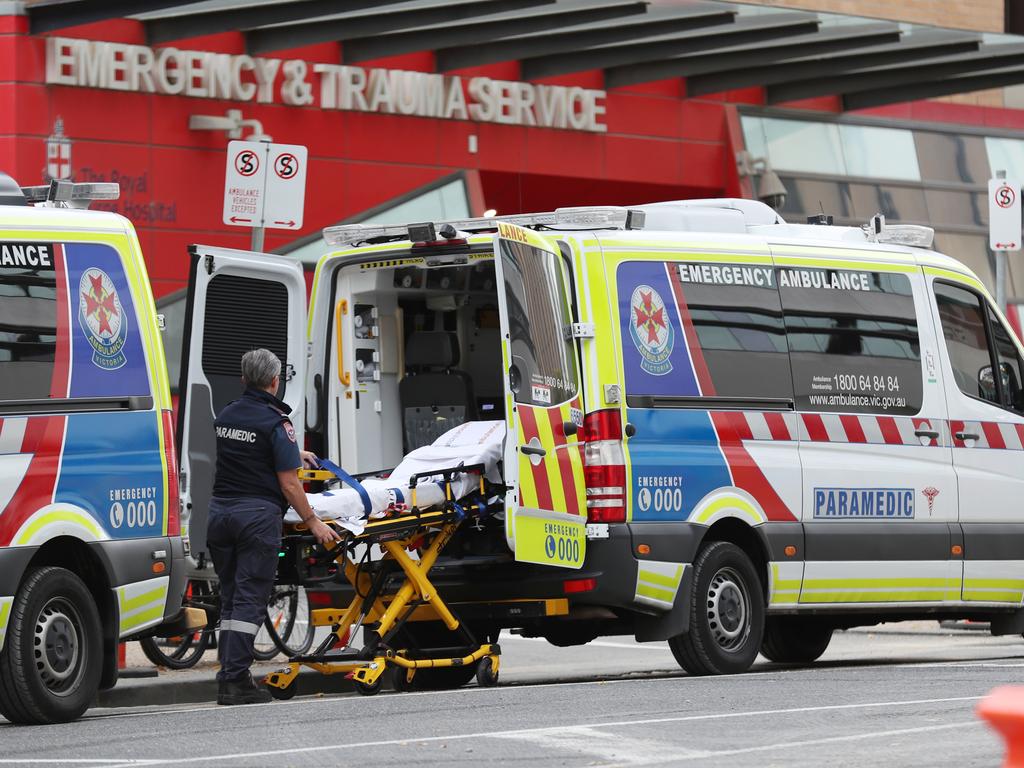
The government should consider deploying GPs to hospital emergency departments to tackle workforce shortages, and the government should embark on an urgent immigration program to boost doctor numbers, the health officials said.
They said thousands of patients should be moved to at-home treatment to take pressure off hospitals, and called for Canberra to fund GPs to operate after hours and on weekends to address the indirect impacts of Covid-19 on the hospital system.
Rising emergency department presentations, ambulance access block, workforce burnout, and the direction of frontline staff to testing and vaccination centres are all increasing pressure on hospitals, on top of Covid-19, they said.
SEVEN MORE BLOOD CLOTS AFTER ASTRAZENECA JAB
Seven more Australians have suffered blood clots after taking a dose of the AstraZeneca vaccine, including one that is critically unwell in intensive care.
Six cases were confirmed in a 19-year-old woman from Victoria, 39, 52 and 66-year old men from NSW, 57-year-old woman from NSW and an 89-year-old man from Queensland. A case involving a 76-year old woman from NSW is being treated as probable.
This takes the total Australian reports assessed as Thrombosis with thrombocytopenia syndrom (TTS) following AstraZeneca to 148 cases (83 confirmed, 65 probable) from about 11.6 million vaccine doses. To date, 16 cases of TTS have occurred after the second dose.
There have been nine deaths in total linked to AstraZeneca, eight of these were TTS and a ninth Idiopathic thrombocytopenic purpura (ITP) or low levels of blood cells that prevent bleeding.
The figures were revealed in the Therapeutic Goods Administration’s Covid-19 Vaccine Weekly Safety Report.
“Four of the new confirmed cases of TTS reported this week were in individuals aged under 60 years. Three of these individuals have been discharged from hospital, but one person remains critically unwell in intensive care,” the TGA said.
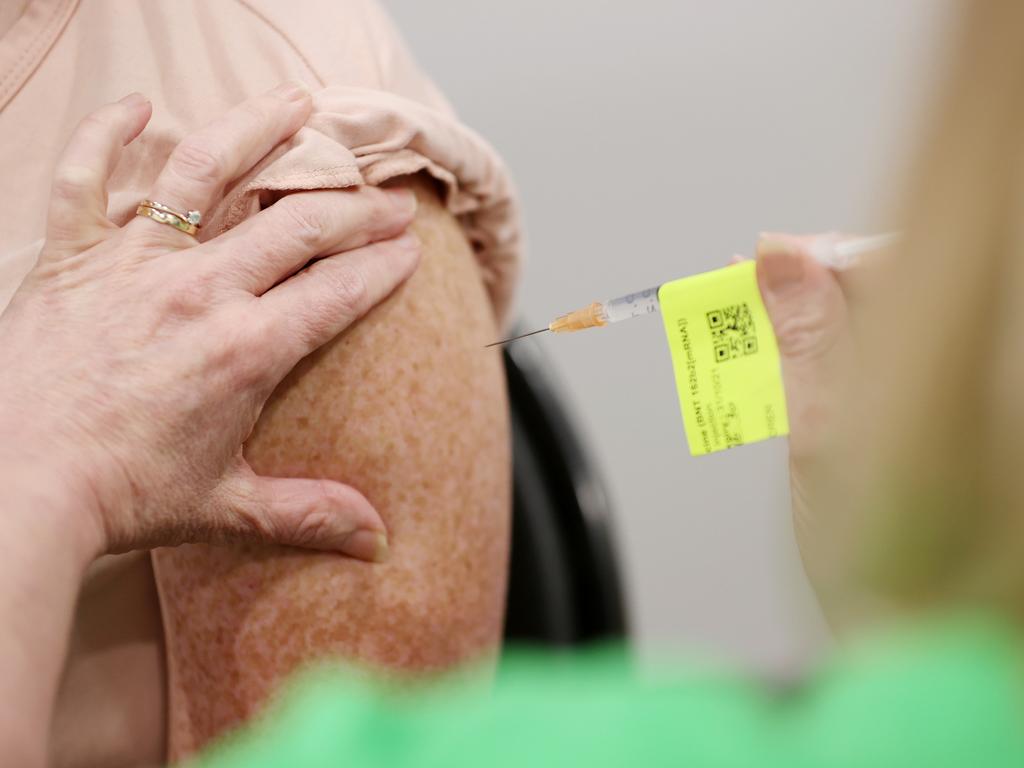
It also revealed there have been 115 reports of likely myocarditis or inflammation of the middle layer of the heart wall following the Pfizer vaccine to 26 September.
“We also continue to carefully monitor reports of suspected myocarditis following the Comirnaty (Pfizer) vaccine, particularly in the younger age groups,” the TGA said.
And it has received five reports of suspected adverse events linked to the Moderna vaccine, to 26 September.
The TGA advises people should seek immediate medical attention if they develop any of the following symptoms after vaccination:
– severe or persistent headache, blurred vision, confusion or seizures
– shortness of breath, chest pain, leg swelling or persistent abdominal pain
– unusual skin bruising and/or pinpoint round spots beyond the site of vaccination.
The most common time period for onset of TTS symptoms is 4–30 days after vaccination.
More Coverage
Originally published as Coronavirus latest: Victoria records 1488 new Covid-19 cases, two deaths, Scott Morrison reopens travel for November





